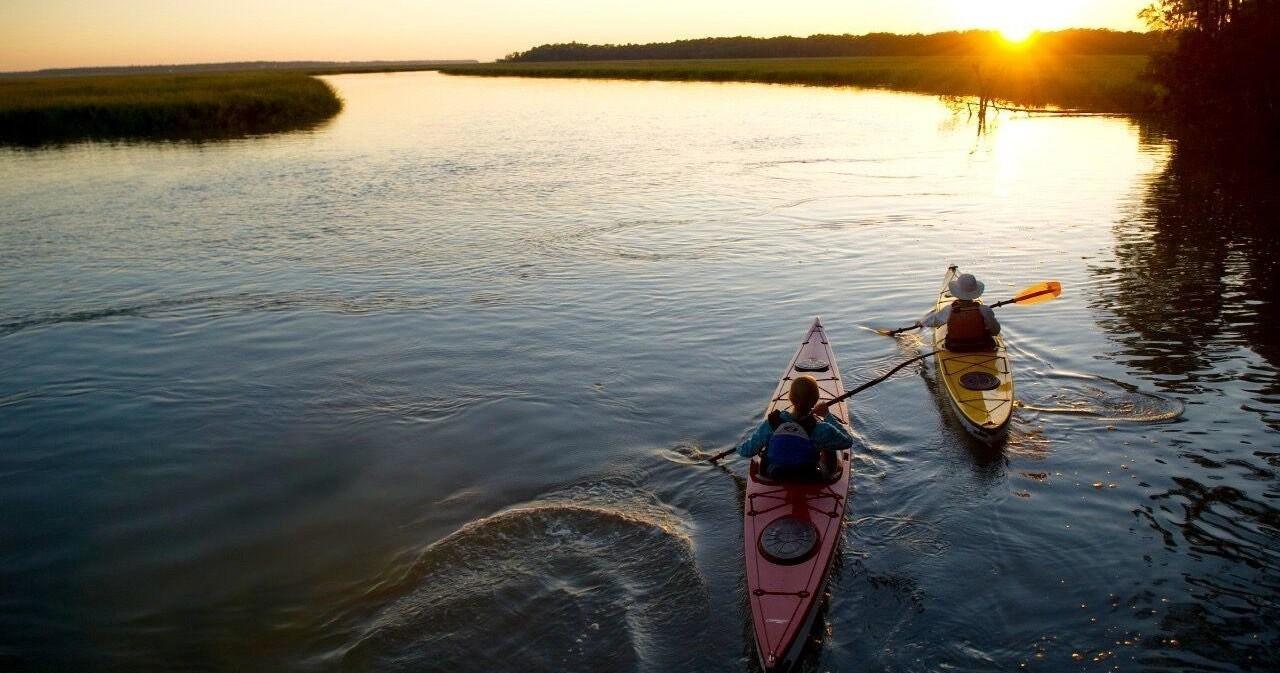Tides, Marsh, and Quiet Miles: Private Kayak Tours on Hilton Head
Two hours of tidal serenity and technique—custom kayaking across Hilton Head’s living marsh.
The marsh wakes before the island does. At first light, the grass stands like a million green quills, and Broad Creek inhales with the tide. An egret tiptoes the slick bank, the wind holds its breath, and your kayak whispers out from the dock. This is Hilton Head at eye level: low, quiet, tidal. On a calm morning, the water seems to pull you forward, as if the creek is curious to see where you’re headed.
Trail Wisdom
Ride the Tide
Ask your guide about timing the tour with a flood or ebb to save energy and see more. Tidal planning can turn a 2-hour paddle into an effortless glide.
Sun Smart Strategy
Wear a sun hoodie, hat, and polarized sunglasses—Lowcountry glare is real even on cloudy days, and the reflection off the water adds up fast.
Footwear That Works
Closed-toe water shoes protect against sharp oyster shells at launches and landings—flip-flops won’t cut it here.
Pack Light, Pack Dry
Bring only essentials in a small dry bag—water, phone, and a snack. Extra clutter makes the cockpit cramped and paddling sloppy.
Local Knowledge
Hidden Gems
- •Quiet backwaters behind Pinckney Island at mid-tide for birdlife and reflections
- •The narrow feeder creeks off Broad Creek that glow gold near sunset
Wildlife
Bottlenose dolphin, Tricolored heron
Conservation Note
Oyster beds stabilize shorelines and filter water—give them space and avoid dragging boats over shells. Stay off sensitive marsh banks to protect habitat.
Pinckney Island was once a Sea Island cotton plantation and became a National Wildlife Refuge in 1975, protecting thousands of acres of marsh and maritime forest.
Seasonal Guide
spring
Best for: Birdwatching, Mild temperatures
Challenges: Variable winds, Strong spring tides
Wildflowers pop and birds migrate through Pinckney Island. Expect comfortable temps and lively tides that reward good timing.
summer
Best for: Calm morning paddles, Family outings
Challenges: Heat and humidity, Afternoon thunderstorms
Aim for early starts to beat heat and wind. Afternoon storms can develop quickly; guides monitor radar and adjust accordingly.
fall
Best for: Clear air, Migratory bird activity
Challenges: Occasional tropical systems, Shorter daylight
Crisp mornings, warm afternoons, and fewer crowds make fall a standout. Watch forecasts during hurricane season.
winter
Best for: Glassier water, Quiet waterways
Challenges: Cooler temps, Wind chill on open reaches
Dress in layers and enjoy serene creeks with better visibility. Cold snaps are brief but plan for wind protection.
Photographer's Notes
What to Bring
Polarized SunglassesEssential
Cuts glare, helps you read shallow oyster bars and spot wildlife just below the surface.
Sun Hoodie or UPF ShirtEssential
Lightweight coverage keeps the sun off without overheating in humid Lowcountry weather.
Closed-Toe Water ShoesEssential
Protects feet from sharp oyster shells and provides better traction at launch sites.
Small Dry Bag (5–10L)
Keeps phone, keys, and snacks dry while freeing up space in your cockpit.
Common Questions
Do I need kayaking experience?
No. Guides provide on-water instruction for all levels, from first-time paddlers to those seeking technique coaching.
How far will we paddle in two hours?
Distance varies with tide and wind, but most groups cover roughly 2–4 miles at an easy pace with breaks.
Will I see dolphins?
Dolphin sightings are common in Broad Creek, but they’re wild animals—your guide will look, but sightings can’t be guaranteed.
What should I wear?
Quick-dry clothing, a sun layer, and closed-toe water shoes. Avoid cotton and bring a light wind layer in cooler months.
Are children allowed?
Yes. Private tours can be tailored to families; ask about tandem kayaks and appropriate ages for your group.
Where do tours launch from?
Launch sites vary by conditions and itinerary, often from Broad Creek near Shelter Cove. Your confirmation will include specifics.
What to Pack
Polarized sunglasses for glare control; Sun hoodie and hat for UV protection; Closed-toe water shoes for oyster shells and slick ramps; Small dry bag with water, phone, and a snack for streamlined storage.
Did You Know
Pinckney Island National Wildlife Refuge spans approximately 4,053 acres and was established in 1975; much of it is salt marsh that supports abundant birdlife and nursery habitat.
Quick Travel Tips
Book morning departures in summer for calmer winds; Check parking and launch details in your confirmation to streamline arrival; Bring a reusable bottle—many guides can refill before launch; Plan extra time after the tour to explore Shelter Cove or nearby beaches.
Local Flavor
After paddling, grab shrimp tacos at Hudson’s Seafood House on the Docks or a sunset table at Skull Creek Boathouse. For a cultural detour, visit the Gullah Museum of Hilton Head to connect the waterway you just paddled with the island’s deeper story. Coffee and a pastry at Watusi Café is a quick refuel before beach time.
Logistics Snapshot
Closest airports: Hilton Head Island (HHH) and Savannah/Hilton Head (SAV). Typical launches are near Broad Creek/Shelter Cove, a short drive from most island resorts. Expect good cell service near town; coverage can dip in backwaters. No permits needed when touring with a licensed outfitter; follow refuge rules and guide instructions.
Sustainability Note
These creeks are part of a sensitive estuary. Pack out all trash, avoid disturbing oyster beds and marsh banks, and keep respectful distances from wildlife—especially feeding dolphins and nesting birds.
